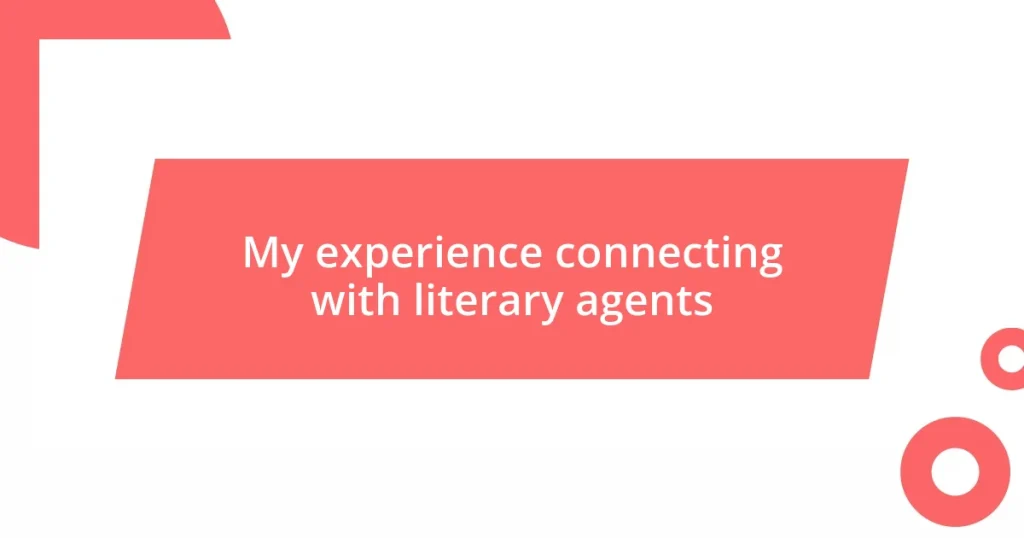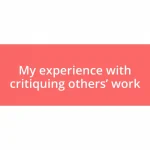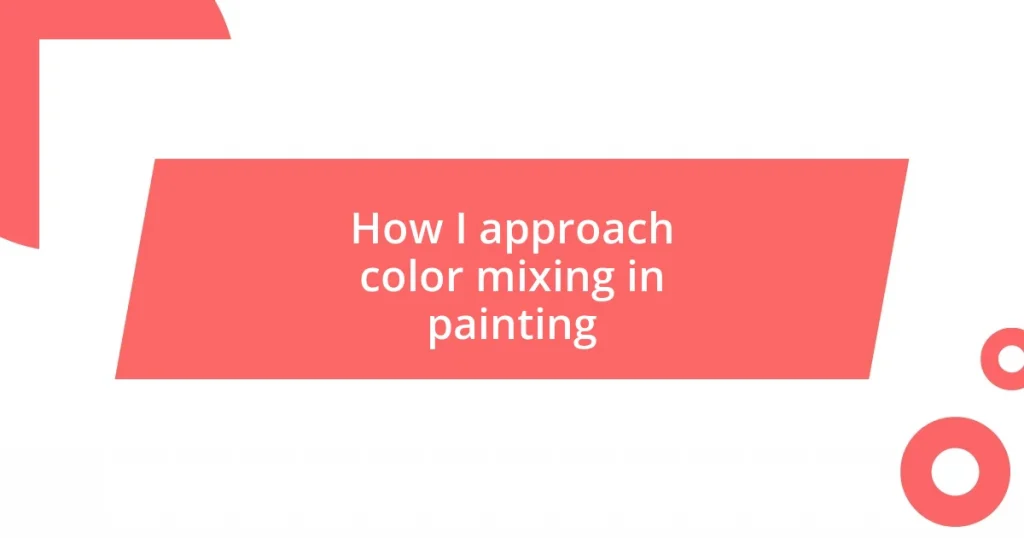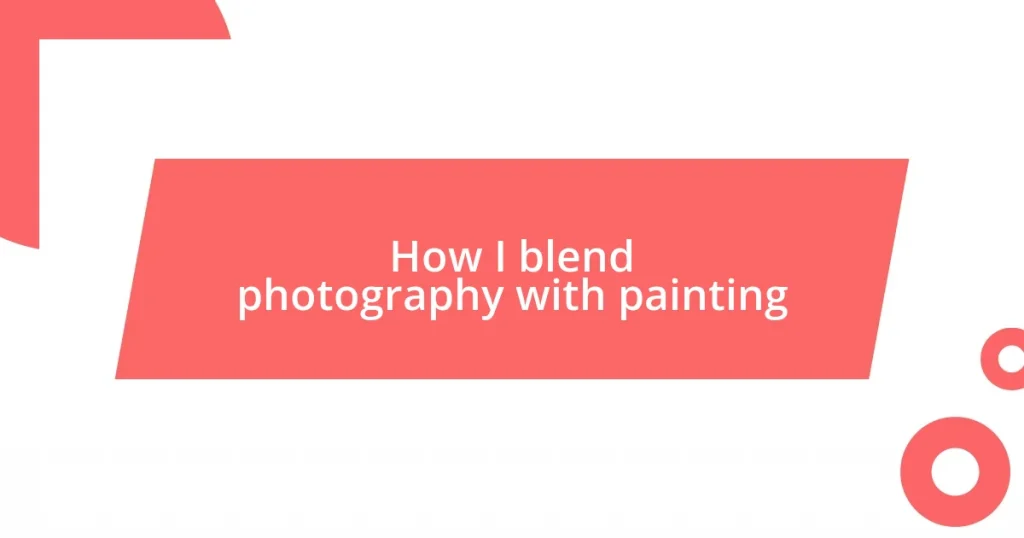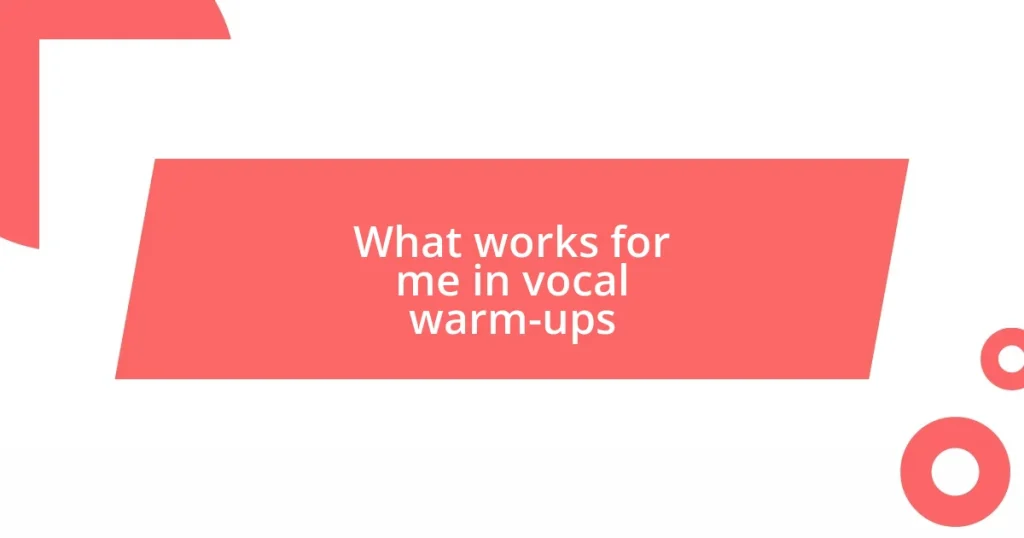Key takeaways:
- Understanding the multifaceted role of literary agents is crucial; they not only sell manuscripts but also provide vital feedback and navigate contracts for fair compensation.
- Effective manuscript preparation involves embracing revisions, valuing feedback from others, and adhering to proper formatting to make a strong impression on agents.
- Researching agents thoroughly, personalizing query letters, and handling responses professionally are key to increasing the chances of successful representation and maintaining a positive reputation in the literary community.
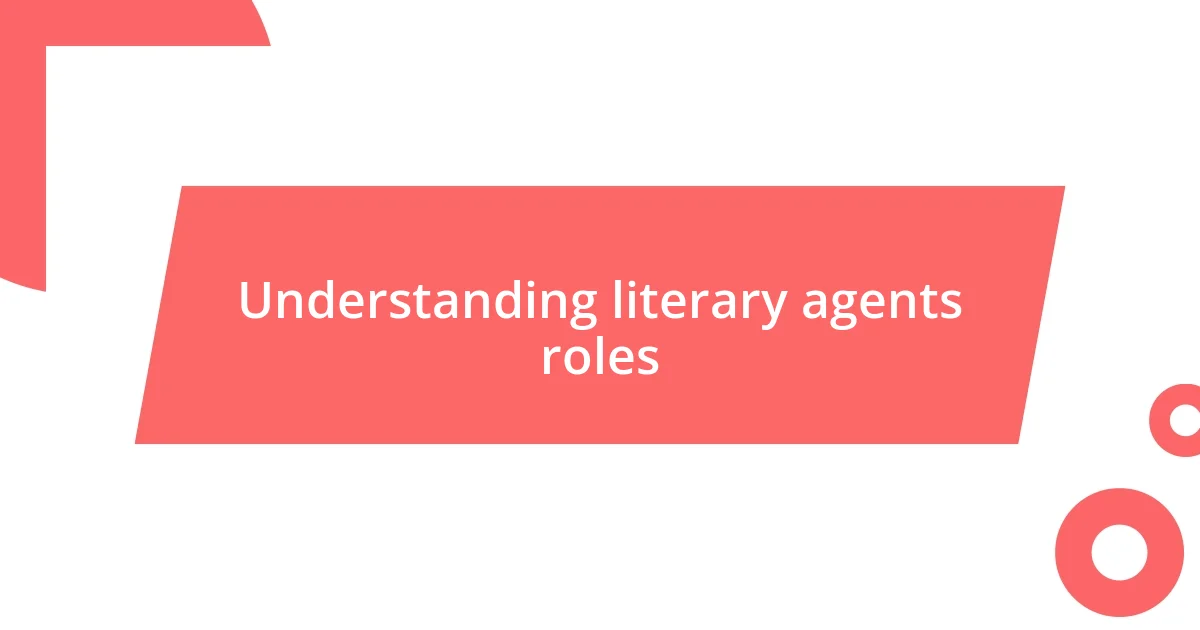
Understanding literary agents roles
Literary agents play a crucial role in the publishing world, acting as a bridge between authors and publishers. From my experience, I’ve discovered that a good agent doesn’t just sell your manuscript; they truly believe in your work and become your biggest advocate. Isn’t that what every writer hopes for—a partner who genuinely champions their vision?
One of the most enlightening moments for me was realizing how an agent’s expertise extends beyond mere submissions. They provide invaluable feedback on your manuscript, helping you refine it to meet the demands of the market. Have you ever had that light bulb moment when feedback transforms your work into something greater? For me, it was a game-changer and made me appreciate the agent’s role even more.
Agents also navigate complex contracts and rights, ensuring that authors are fairly compensated for their work—a step that can feel overwhelming for many writers. I remember feeling anxious about the nitty-gritty details, but my agent’s confidence reassured me. It made me wonder: how many writers might overlook this vital aspect if they didn’t have that support? Understanding this multifaceted role really shines a light on why securing a good agent can be one of the most impactful decisions in an author’s career.
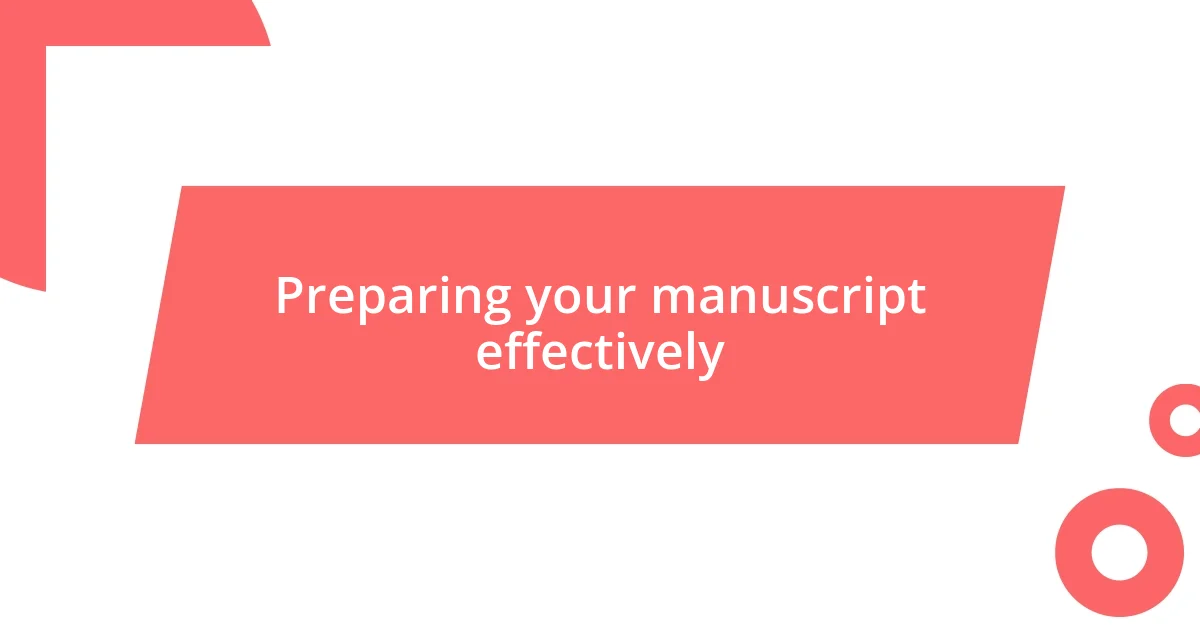
Preparing your manuscript effectively
Preparing your manuscript effectively can be a transformative process. I always believed that my first draft was the heart of my story, but I soon learned that revisions breathe life into it. It’s almost like sculpting a statue; you chip away at the rough edges until the beauty beneath emerges. When I finally embraced the editing process, I discovered how much stronger my voice became.
Additionally, understanding the importance of feedback was a turning point for me. I remember sharing my manuscript with a trusted friend who wasn’t afraid to provide honest criticism. At first, I felt defensive; it’s hard to hear something you’ve poured your heart into isn’t perfect. But that feedback pushed me to explore new angles, enriching my characters and plot. Have you ever had someone point out something you were too close to see? This experience reminded me that collaboration can elevate my work in ways I never anticipated.
Lastly, paying attention to formatting is crucial when preparing your manuscript. It may seem tedious, but proper formatting can immediately impress a literary agent. When I first submitted my work, I overlooked the guidelines and missed my chance with a dream agent. Learning from that experience, I now ensure that every manuscript I send out is polished and adheres to industry standards. It’s a simple step, but it can make a significant impression.
| Key Aspect | My Experience |
|---|---|
| Revision Process | Chipping away at the draft revealed my story’s true essence. |
| Feedback Reception | Constructive criticism transformed my characters and plot. |
| Formatting | Adhering to guidelines opened doors I had previously overlooked. |
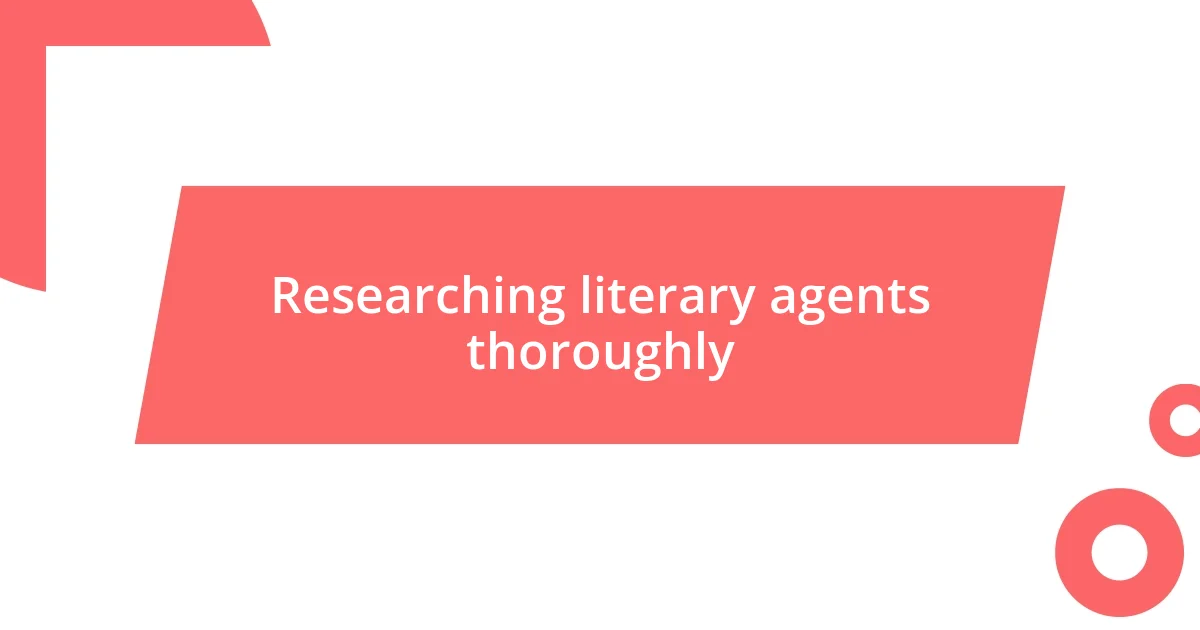
Researching literary agents thoroughly
Researching literary agents thoroughly is an essential step in the journey toward publication. I learned this the hard way when I initially sent out queries without proper vetting. It’s not just about finding anyone with the title “literary agent”; it’s about seeking out those who align with your genre and vision. Each agent has distinct tastes and preferences, making targeted research indispensable.
Here are some useful tips I’ve gathered from my experiences:
- Explore agent websites: Look for submission guidelines and genres they represent. This can save you from pitching to someone who doesn’t accept your type of manuscript.
- Follow their recent sales: Research the books they’ve successfully sold to get a feel for their market savvy and industry connections.
- Utilize social media: Platforms like Twitter, where many agents provide insights, can reveal their personality and values. Engage with their posts; it humanizes them, making the query process less daunting.
- Read interviews: Interviews can offer a peek into an agent’s preferences and working style, something that could create a more compelling query letter.
- Check databases and resources: Utilize resources like QueryTracker or the Association of Authors’ Representatives to discover professional credibility and detailed agent lists.
I remember the sense of déjà vu when I stumbled across an agent’s blog post that mirrored my writing style and themes. It felt like a light bulb moment, making me realize that targeting the right agents can significantly elevate my chances of finding the perfect match. By treating my research with the same care as crafting my manuscript, I transformed my approach and, finally, my results. That shift taught me the importance of diligence and purpose in bringing my work to the right audience.
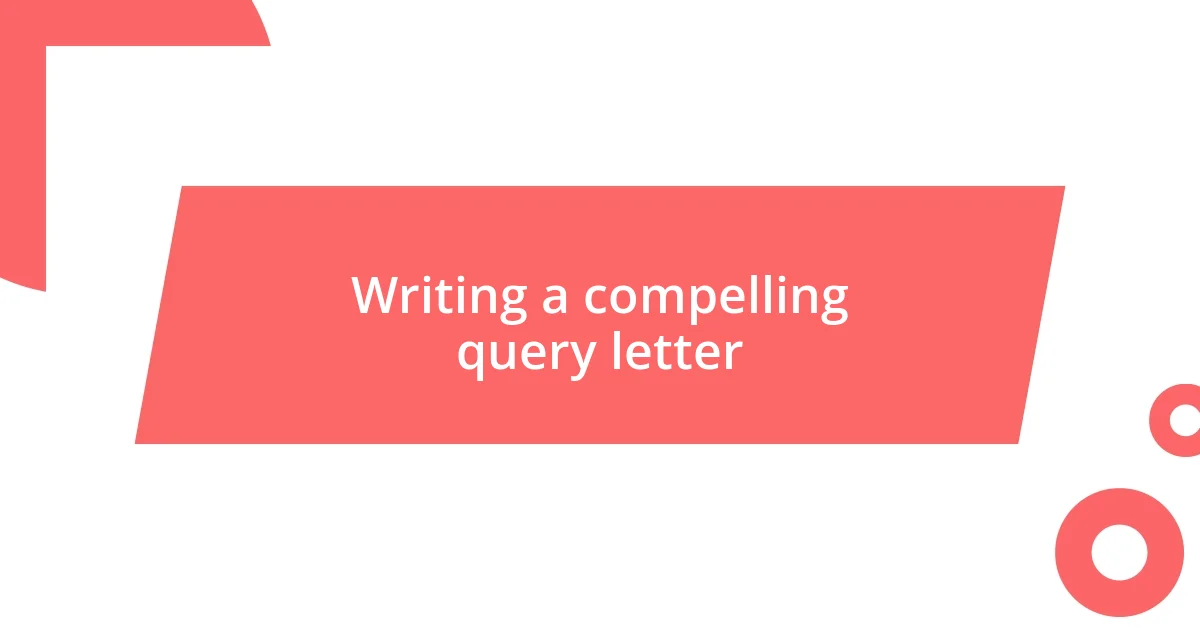
Writing a compelling query letter
Crafting a compelling query letter is an art form that requires both precision and creativity. I remember the first time I sat down to write one; my stomach was a tornado of nerves. I quickly realized that my opening lines needed to grab the agent’s attention. If I didn’t hook them in the first few sentences, they might never get to the heart of my story. I started with a strong premise—something juicy that teased the conflict in my novel. Have you ever wondered how impactful a single sentence can be? It can set the tone and entice someone to keep reading.
Beyond a sharp opening, I’ve learned that personalizing the letter is crucial. When I tailored my queries to reflect the specific interests of the agents, I felt a noticeable difference in my responses. Mentioning why I chose a specific agent based on their previous works or interests showed that I wasn’t sending a generic pitch. I recall one agent responded positively because I mentioned a book of theirs that resonated with the themes in my manuscript. That little connection made a world of difference.
Lastly, clarity and brevity are paramount. During my early attempts, I tended to ramble, thinking I needed to convey everything about my plot and characters. But as I revised my letters, I focused on the essentials: a brief synopsis, my bio, and what makes my work stand out. This streamlined approach not only made my letters more effective but also reduced my anxiety—concise letters were much easier to write! Have you tried trimming the fat from your queries? It might surprise you how liberating it feels to communicate your story simply and clearly.
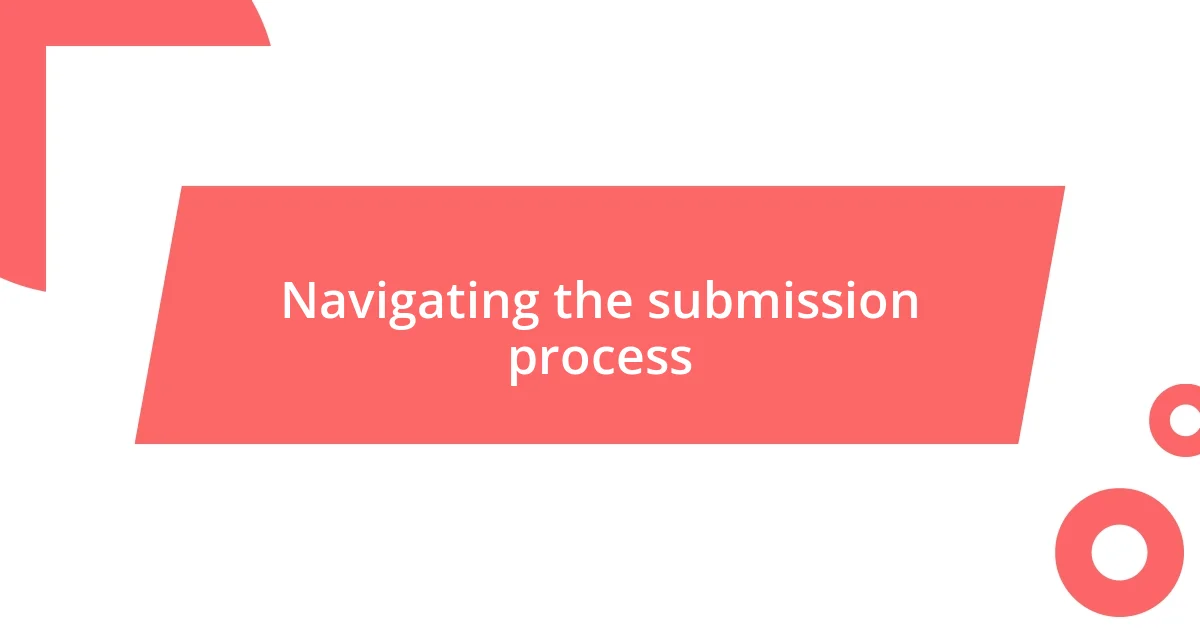
Navigating the submission process
Navigating the submission process can feel like walking a tightrope, especially when you’re balancing excitement and anxiety. I distinctly remember the day I hit “send” on my first batch of queries; my heart raced as if I had just run a marathon. Each submission felt like a tiny piece of my soul being sent into the vast unknown. This was just the beginning of my journey, filled with moments of both anticipation and self-doubt.
When it comes to managing the waiting game after submissions, I found that patience is more than a virtue—it’s a necessity. Initially, I would check my email obsessively, refreshing the page as if it were my lifeline. Over time, I learned to channel that nervous energy into productive pursuits, like revising my manuscript or working on new projects. It’s amazing how shifting my focus helped me regain some control. Have you ever felt like you were holding your breath? I discovered that setting a timeline for when I would reevaluate my queries helped me keep my sanity intact.
As responses began to trickle in, the spectrum of feedback ranged from polite rejections to enthusiastic requests for full manuscripts. I remember the thrill of getting a request for more materials—it felt like my hard work was finally being recognized. But I also faced rejections; they were tough to swallow. Yet, in each response, I sought to find constructive feedback. I often asked myself, “What can I learn from this?” and believe me, that mindset shifted my entire perspective on the process. Embracing the journey, including the ups and downs, ultimately refined my craft and resilience.
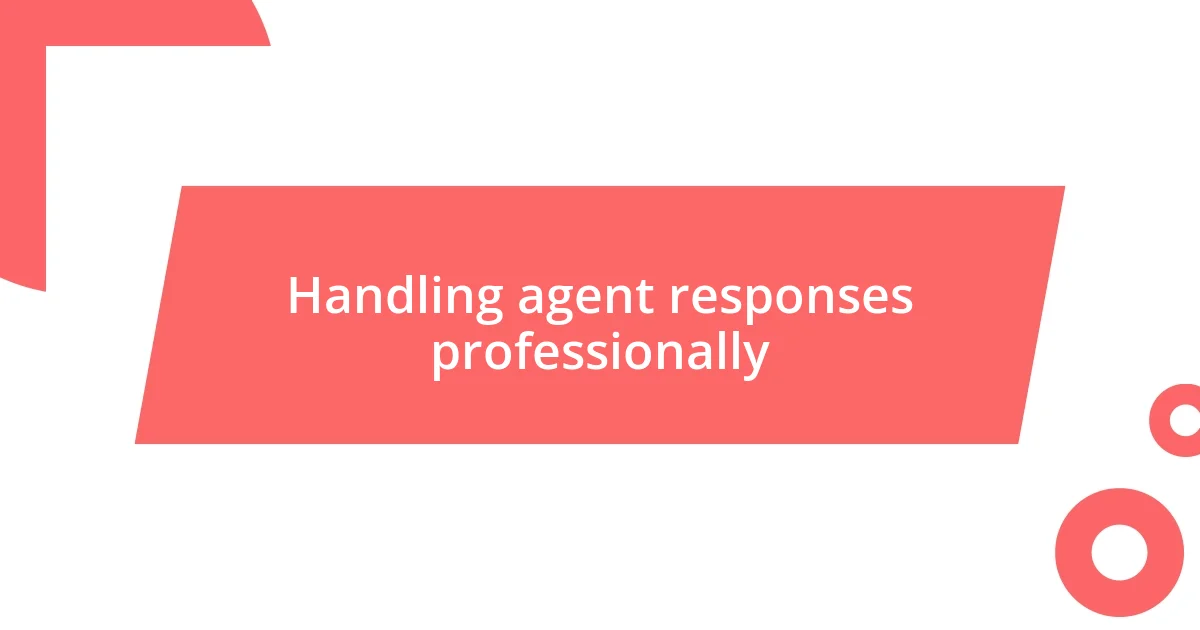
Handling agent responses professionally
Handling agent responses professionally is crucial for maintaining a positive reputation in the literary world. I vividly remember receiving my first rejection letter. Instead of sulking, I took a moment to appreciate the fact that I had entered the arena. After all, each response holds value, even if it isn’t what you hoped for. Isn’t it interesting how a few kind words can soften the blow of rejection?
When an agent responds with feedback, I’ve learned to embrace it wholeheartedly. There was a time when I received detailed comments on my manuscript, and instead of replying defensively, I thanked the agent for their insights. A genuine acknowledgment can sometimes leave a lasting impression. Have you ever considered how a simple thank you can open doors for future interactions?
Positive responses are equally important to handle professionally. I recall the exhilaration of being invited to send a full manuscript. But rather than jumping at the opportunity without thought, I took a breath and crafted a courteous, enthusiastic reply. This small step of professionalism reinforced my dedication to my craft. It’s fascinating how a thoughtful response can build a lasting connection, don’t you think?










